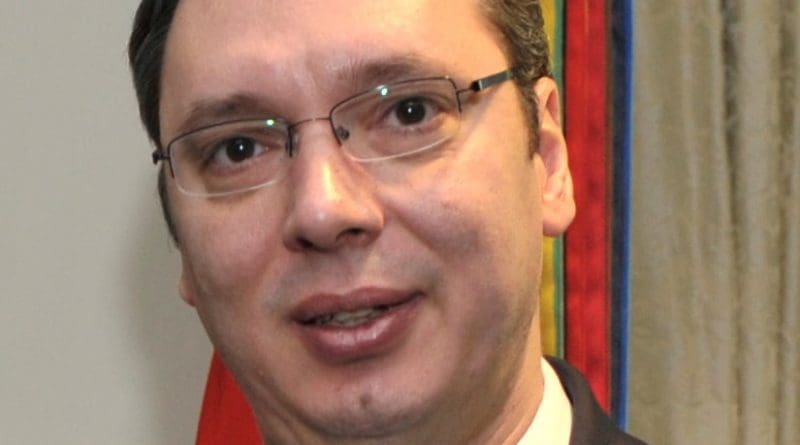Serbia: Vucic Wins Presidential Elections
By Filip Rudic
Serbian Prime Minister Aleksandar Vucic has won 54.9 per cent of the vote in April 2’s presidential election, securing a five-year term as Serbia’s president, according to the Centre for Transparency, Research and Accountability, CRTA.
Vucic left other candidates trailing behind him in the polls, with Sasa Jankovic coming in second with 16.2 per cent.
Addressing the press conference at the headquarters of the ruling Progressive Party, Aleksandar Vucic said he was proud of the support he received and that election results showed which direction Serbia wants to go.
“It’s important that the win was as clear as a tear. I got 12 per cent more votes then all the other candidates together.
“When you have results like this, there is no instability – Serbia is strong and it will be even stronger,” Vucic said.
Spoof character Ljubisa Preletacevic Beli won 9.4 per cent of the vote, beating the former President of the UN General Assembly Vuk Jeremic who garnered 5.8 per cent.
Leader of the nationalist Serbian Radical Party Vojislav Seselj came in fourth with 4.4 per cent of the vote.
The estimate is based on 96 per cent of votes counted.
The turnout in Serbian presidential elections was 54.2 per cent.
CESID, also an NGO that is monitoring the elections, announced that based on the counts of 92 per cent of votes, Aleksandar Vucic won 55.8 per cent of votes, Sasa Jankovic 15,5 per cent, Ljubisa Preletacevic – Beli 9.6 per cent, while Vuk Jeremic won 5,7 per cent of votes.
Djordje Vukovic of CESID said that the results could still change by one or two per cent, but there is no doubt that Vucic is Serbia’s next president.
According to the Centre for Transparency, Research and Accountability, CRTA, no major irregularities have been reported.
CRTA noted irregularities in 3 per cent of polling stations, including that electoral commissions sometimes did not check the personal documents of voters, failed to check whether a voter had already cast their ballot, and failed to mark voters’ fingers with special ink to ensure they did not vote again.
In Leskovac, police intervened when an activist physically attacked the head of the electoral board, as well as in Pancevo where members of extremist groups gathered in front one of the polling stations.
CRTA also noted that in Zajecar, Knjazevac and Ali Bunar, police stations were open to urgently issue voters with certificates to show that they had filed requests for new ID cards, which would enable those without valid IDs to vote.
In Ali Bunar, a group of 50 people went to police stations to get certificates.
In three incidents, two in Leskovac and one in Novi Sad, observers found that voters were not able to cast ballot because someone had already voted instead of them.
In five municipalities and towns, observers found people collecting information on who had turned out to vote and who had not.
CRTA filed three charges linked to suspected vote-buying in Vojvodina’s small towns Temerin, Beocin and Slana Bara.
“[All these incidents are] isolated cases that do not represent a trend that could endanger the regularity of the election process,” CRTA said.
The number of people eligible to vote was 6,724,949. Voters could cast ballots at 8,523 polling stations.
Voting also took place at 90 polling stations in Kosovo and at 53 polling stations in 23 other foreign countries.

